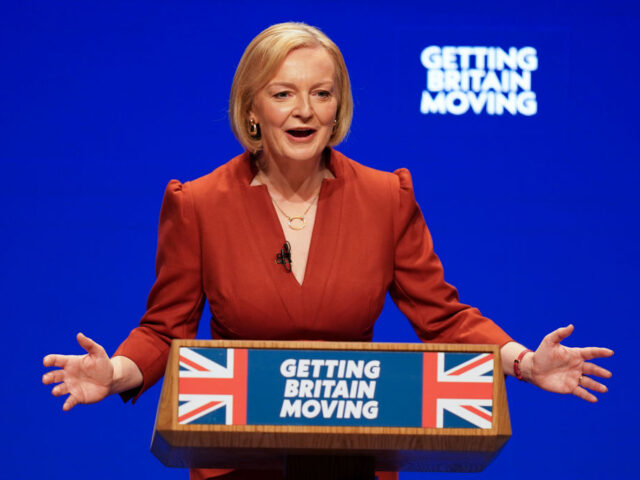Britain’s new Prime Minister defended her tax-cutting agenda at her first major policy speech as leader, saying change inevitably caused disruption and that there would be people who wanted to maintain the status quo.
In the closing speech to the UK Conservative Party’s annual conference, Prime Minister Liz Truss said — when not being interrupted by green protestors, somewhat proving her point that some would object to a growth strategy — she intended to break the country out of its “high tax, low growth cycle”.
The comments come after two tumultuous weeks in which the establishment media and markets punished the government for an unexpectedly forthright ‘mini budget’ announcement. Despite the enormity of some measures — the energy support package for homes and businesses is Covid-era level in its sheer size, at something like £150 billion — what really rankled was a tax cut on higher earnings.
‘The abolition of the 45p tax rate became a distraction from the major parts of our growth plan, that is why we are no longer proceeding with it, I get it and I have listened.’
PM Liz Truss addresses her U-turn on the abolition of the 45p tax rate. pic.twitter.com/fm36dKP0yS
— GB News (@GBNEWS) October 5, 2022
Reducing the rate at which earnings above £150,000 ($180,000) a year are taxed from 45 per cent to 40 per cent was a comparatively modest measure at a projected £19 billion for the government in the first year, but nevertheless, the campaign against it built steam and just days later, it was dropped. An early victory against the new government.
Speaking on Wednesday Truss brushed aside that furore, framing the scrapped tax cut as a small matter that was distracting from her greater program and was therefore right to drop. But she also defended her agenda of broader change — and other tax cuts — in her speech, and particularly the idea that achieving meaningful change would mean disruption which would sometimes be unpopular.
She said:
I’m determined to take a new approach and break us out of this high tax, low growth cycle. And that’s what our plan is about: it’s about getting the economy growing and rebuilding Britain through reform… We need to step up. As the last few weeks have shown, it will be difficult. Whenever there is change, there is disruption. And not everybody will be in favour of change. But everyone will benefit from the result.
Truss stuck with the importance of tax cuts through her speech, saying there was a moral imperative to reduce the state’s cut of people’s earnings, an act which would also fuel economic growth. In an appeal to traditional conservative values which, alongside her sometimes Thatcher-adjacent rhetoric, seems to be a key element of Truss’s pitch to supporters the new Prime Minister continued:
Cutting taxes is the right thing to do morally and economically. Morally, because the state doesn’t spend its own money. It spends the people’s money. Economically, because if people keep more of their own money, they are inspired to do more of what they do best. And that’s what grows the economy. When the government plays too big of a role, people feel smaller. High taxes means it feels less worthwhile, working that extra hour, going for a better job, or setting up your own business.
…I remember my shock, opening my first paycheck, seeing how much the tax man had taken out. I know this feeling replicated across the country!
The speech delivered no new policy and no surprises but rather was a consolidating exercise after a rough first few weeks of a new government straight in at the deep end with a faltering global economy and looming energy crisis. The appearance of a pair of Greenpeace activists with several cloth banners secreted about their persons — neatly disguised as Tory activists — interrupted proceedings but likely gave Truss a boost.
Having made a joke about their appearance Truss later addressed what she called the “anti-growth coalition”, in other words the loose alliance of parties and activists on the left who might conceivably form the next UK government in two years time if Truss doesn’t get a handle on things, telling the conference: “They prefer protesting to doing, they prefer talking on Twitter to taking tough decisions.”
‘Who voted for this?’
Prime Minister Liz Truss is heckled by Greenpeace activists during her first speech at the Conservative Party conference. pic.twitter.com/oPbaMvNKnv
— GB News (@GBNEWS) October 5, 2022

COMMENTS
Please let us know if you're having issues with commenting.